As indie authors, the freedom to write whatever we like – including swear words and curse words – is one of the great joys of self-publishing – but what responsibility does the self-published author have for the finer feelings of the reader or audience? Debbie Young asks the question after finding herself unexpectedly wrong-footed when reading her short stories in sacred settings.
“It's not appropriate, it's not clever and it's not funny.” Such is the classic rebuke from parents seeking to stop their children from swearing – but does the same hold true of swear words in your writing?
Given that I'm usually writing gentle, whimsical fiction rather than violent crime thrillers or police procedurals, bad language is not a matter I usually think much about. But my use of swear words sprang to top of mind recently when I twice gave public readings of my short stories in religious buildings.
The first of these was at the Hawkesbury Upton Literature Festival, a small, free, fun, family-oriented event that I organise in my village. In its first year, we held the event in one of our village pubs, The Fox, where the odd expletive comes as no surprise.
But this year, as the festival had grown, we staged the readings in the local Methodist Chapel – a wonderful setting, full of light and air and calm.
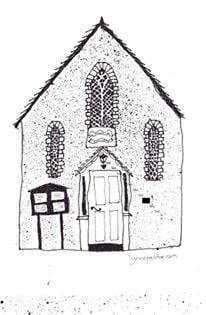
Sweet and simple – the Methodist Hall, captured by festival author, artist and ALLi member Lynne Davidson
When I booked it, I was told the only rule was “no alcohol”, which was fine. We set up a tea shop instead of a bar. (When life sends you teabags…)
I confess I also made a festival banner to subtly disguise the overtly religious decoration on the lectern, just so it didn't feel too incongruous that we weren't reading scriptures. The banner echoed a familiar line from the children's TV storytelling programme, “Are you sitting comfortably? Then I'll begin.”
Dan Holloway told me later he'd assumed it was part of the fixtures and fittings of a very cool and funky church!
But it didn't occur to me to ask readers to modify their readings to avoid anything that might offend Methodists, and I'm pleased to say there were no complaints – quite the opposite, in fact.
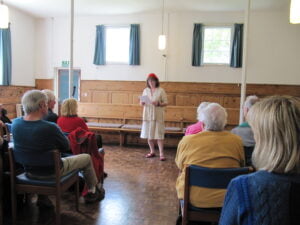
Reading “Drunk in Charge” in the Quaker Meeting House – I hadn't really thought my choice of story through!
A couple of months later, I found myself in the Evesham Quaker Meeting House reading one of my stories as part of the town's new Festival of Words, organised partly by ALLi author Lindsay Stanberry-Flynn. As I sat awaiting my turn to read, I flicked through the story I planned to read, slightly nervously as it was not yet published, and it was the first time I was sharing it with anyone.
Until then, if asked, I'd have said I barely swear in my stories, but in this piece of around 2,000 words, several words leaped out at me. Called Drunk in Charge, it's about a couple stopped by the police on the way home from a party on suspicion of drink-driving. Too late, I realised this might not have been the best choice of story for the setting, given its subject matter.
Should I Give a Damn?
It's hard to imagine that such a scene could take place without a few curses from the couple, if not the policeman, but given that my own swearing tends to be on the mild side, primarily blasphemy, I'd thought the story's language innocuous until applying the Quaker's prism.
My husband would say I have a Quaker's ear already, as I tend to leave the room when he's watching films that feature lots of swearing. I find dialogue that features the f-word in every sentence tedious, even when it's supposedly done for the sake of realism.
But my Evesham experience it made me realise that swearing really is in the ear of the beholder.
I don't think this epiphany will make me change what I write in any way, but I found it an interesting wake-up call, and I'm sure I shall think twice before reading a story featuring swearing in a place of worship in future.
OVER TO YOU Have you ever moderated your language out of consideration for your audience? Or conversely made it more colourful because it's expected in your genre? Is bad language justified for the sake of realism, or does it become distracting? Is even asking any of these questions an odious overture to censorship? Pile in and tell me your views in the language of your choosing!
#Authors - do you give a damn about bad language in your #writing? asks @DebbieYoungBN Share on XRELATED POSTS

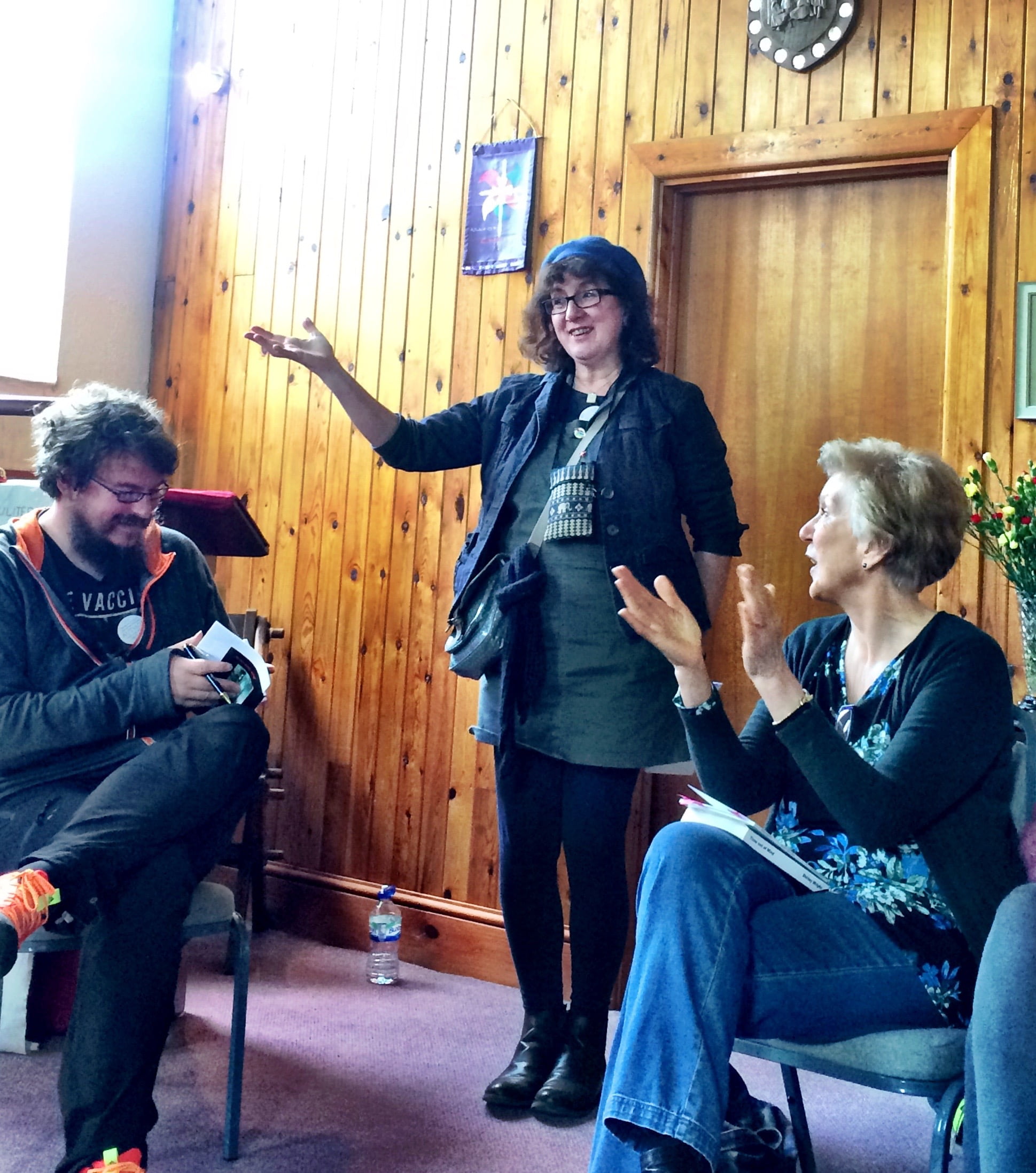
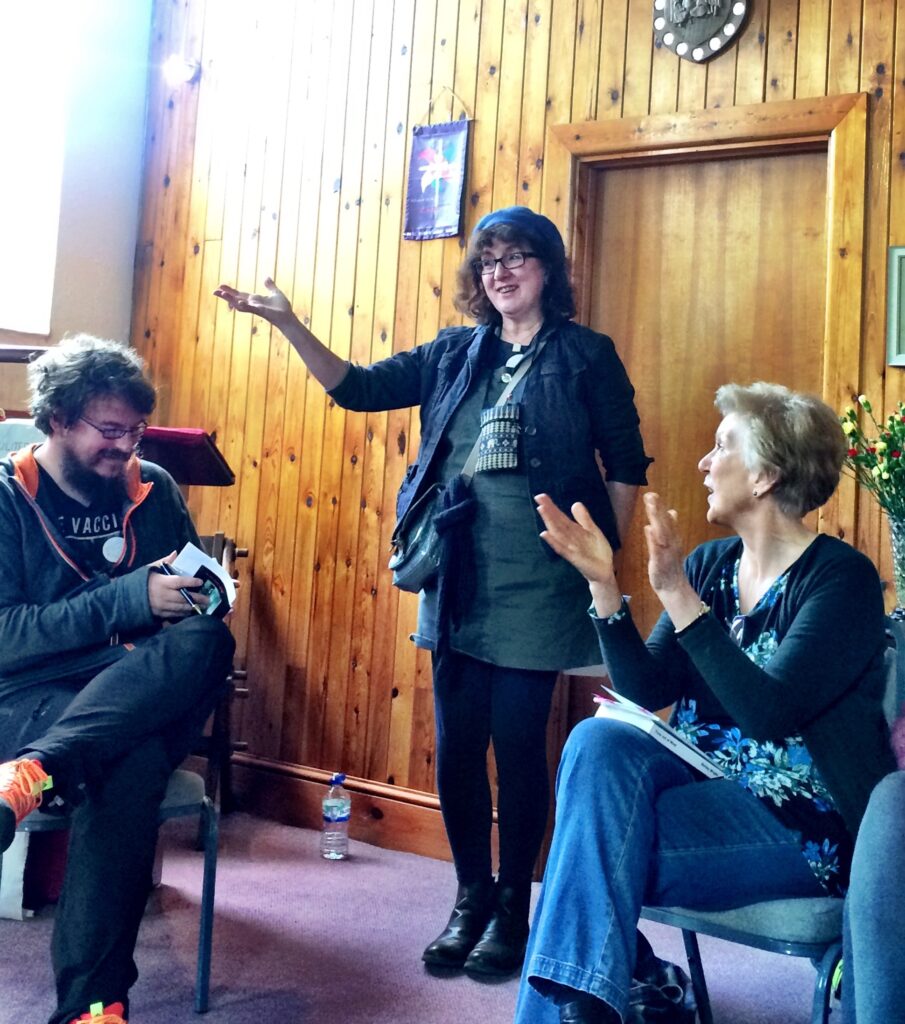

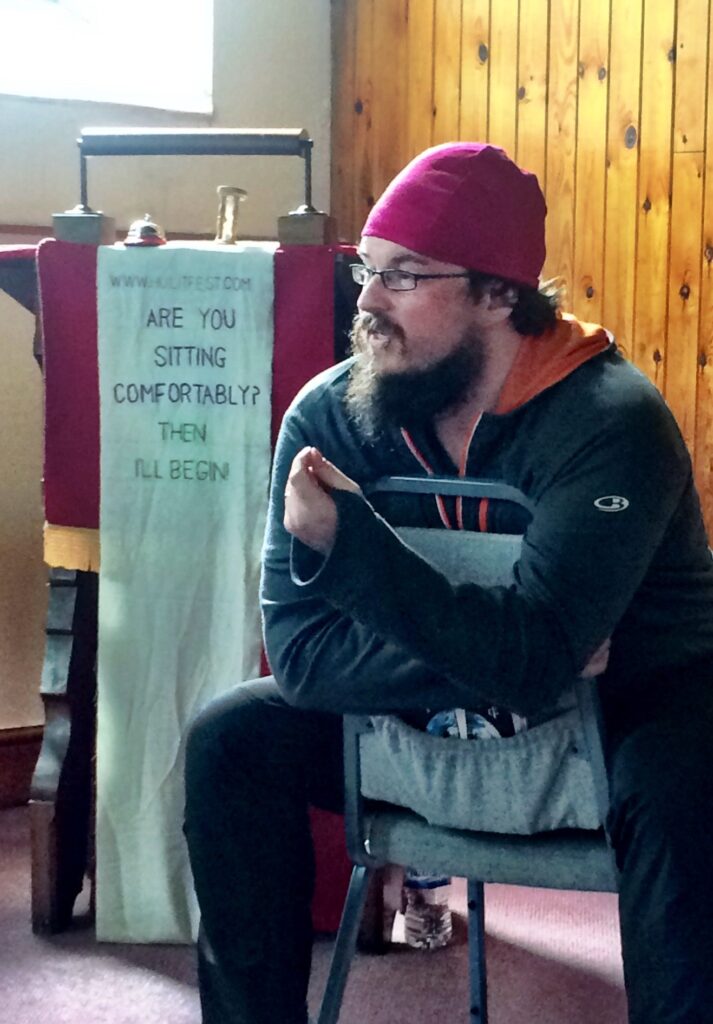



Sometimes, swear words just fit and need to be used. I have found that not using many and then dropping a big one at just the right moment makes a great splash. As far as reading in public, I think a good rule of thumb is to ask your venue about reading swear words or other kinds of content.
If your character wants to swear, then let ’em.
I recall being shocked in 1975 during a break between classes at law school in Washington State when a fellow student used the f-word in mixed company. Now . . . not so much. I used the f-word in chapter 1 of my latest novel, Marble Creek, in my protagonist’s thoughts. Shot, he was eluding his shooter in the dark and rain up the “steepest fucking street in Seattle.” If you’ve ever been to Seattle. . . However, I probably won’t read the chapter in public. This was a very interesting subject and I read every comment.
I write mysteries. Cops and private detectives don’t say, “Oh my!” at crime scenes. But I do try to keep the cussing down to a minimum (and none in cozy mysteries). It’s challenging at times to make the dialogue realistic without a lot of swearing.
In one of my books, one of the main characters actually drops the F bomb, once. It’s totally appropriate for the scene. One reviewer said she liked the book, except for the swearing. Another chastised me for not warning her that it was Christian fiction (I guess because the main characters go to church). I decided after that to do my best to keep the cussing to a minimum and not worry about it. A book is never going to be everyone’s cup of tea.
I am one who wishes there were a rating for books like there is for movies, so readers understand ahead of time what they are getting into. When I write book reviews I objectively mention whether there is much swearing, sex, or violence, as a heads up to those who prefer their reads more “vanilla.” Personally, I won’t read books with a lot of serious swearing (or graphic sex or violence). A little is okay, a lot is at the least distracting and tiresome, as it is with anything done again and again and again, especially on paper. I edited and published a former Army medic’s combat memoir and we used only a scattering of mild swearing even though soldiers commonly use salty language, especially when facing death. Doc himself was appalled by other war memoirs full of swearing. We also did a balancing act when describing injuries. And so we are able to reach a wider audience, including generations within a family. The book has made an impression without lots of swearing and blood and we will never have to worry at readings. All depends on the book’s characters and how narrow you want your audience, and if you don’t mind bad reviews from unpleasantly shocked readers. Just know the audience you’re aiming for. I agree with David Penny’s comments.
I recently did am inventory of F- words on my three novels – I think there were 45, 37 and 28 uses of an F-word variant through 240,000 words.
I’m writing about Boston politicians, for crissakes.
Interesting: when I a poem read at this year’s Hawkesbury, I was planning to read a wryly funny piece called ‘Country Style Love’, which hits back at the departed lover in the style of a country & western song. For some reason,I was strongly urged, (from my own inner feelings) not to read this, but to read my ‘Magi’s Wife’s Tale’, a reply to T S Eliot;’Journey of the Magi.
Okay, not about swearing – but it was definitely in response to reading in the Methodists Chapel, and to several who I already knew were local Methodists …!
In my books, the f-word and its friends appear as and when suitable. I haven’t worried about this. I’m still considering whether I should … since they can be used in seriously rough and threatening ways,whereas my characters use them merely as emphathics.
How did they react?
I was at a reading by Donal Ryan once and he did skip a couple of lines in one section he was reading as I think he felt it was just too crude for the audience.
I read a farming memoir recently and there were a few F words in it, they weren’t in dialogue and just felt unnecessary and a bit crude I thought. Being Irish and a farmer, we’re perfectly accustomed to serious swear words but I found they jumped out at me and spoilt that part of the reading.
Amazon rejects reviews that contain swearwords. This happens al the time, whereas Good Reads (same firm?) doesn’t blench. What I did was cut out the quotation that included the offensive word and re-submitted the review, OK, all cleaned up. The censor even did it for me once, cutting out the ‘i’ in ‘shit’ and substituting *.
You are quite right about self-publishing giving freedom. Punching Judy, my novel about a habitual swearer had hundreds of swear words, some I invented and they were funny, especially when she encountered prissy social workers or court officers.
There’s the work itself, and where the work is received.
For the former you’ve got to be authentic. Yes, too often swearing doesn’t have a purpose. But if a character is one who would swear (e.g. someone from my working class Manchester background) then if they’re not swearing it’s false. Sure, don’t write about those kind fo people if you don’t want, fine. But characters need to be true. And that includes sometimes being unlikable or wrong or flawed. Jane Austen is a great writer, I love her works, but if every book was Pride & Prejudice I would gouge out my eyes.
Then there’s where you do a reading, and which bit you select, and what effect you want to have on the audience. Swearing is just one part fo those considerations that any professional would always consider.
You could just as easily apply this to violence or cruelty. At one literary book launch I read out the entirety of my story from the collection. It’s a pretty horrible piece, with no let up. Not gratuitous, because it is making a point that is threaded through the whole narrative, but still disturbing. In that case I decided the audience were tough enough to be pushed slightly beyond what they were comfortable with, because they were adults. Would I have still read it out to to teenagers or children? Totally different considerations.
Back to wearing. I remember one review’s criticism of my first novel, Turner. Amongst all the praise for the story and tension there was one mention of a character (Chris Turner) within having a “potty mouth”. Which was true, but still a strange criticism. The extreme swearing from that character in two scenes is not gratuitous – it is an attempt by the character to upset and distract his antagonist, to “turn” the situation around. It’s totally relevant to the set up and the reversals, and true to his character (a central element is a symbolic battle over identity about who is “the turner”). I couldn’t avoid upsetting the occasional puritan without neutering the whole tale. I guess we just have to stick to our guns. Which is ironic when some cultures that hate swearing are okay with gun ownership, or with violence in books and films, or with declaring war – yet somehow the little noises we make with our mouths are worse than all of that. Human values are strange.
This made me laugh, Debbie. In my experience, Quakers are pretty unshockable in most contexts. Their strictures against ‘swearing’ are more to do with not swearing on the Bible, because they don’t believe one should have two standards of truth, one for everyday and one for special occasions.
I have to admit there are certain passages in my book (which is about racism and street violence in the 1980s) that I didn’t mind writing, but would feel pretty uncomfortable reading out loud anywhere, let alone in my Quaker Meeting. Didn’t stop them stocking it in their library though, I am happy to say.
Swearing is like sex. The question is all too often asked, and criticism given, in the wrong way. We are always being asked if a book has too much, but so rarely if it has too little. Which suggests we see it as somehow outside of regular human experience. Most things – from eating to descriptions of clothes to how you go about your commute, are things we would expect to see in balance with our characters and the story’s needs. Why not sex and swearing?
I was once asked whether I was nervous about reading my work out loud given the nature of a lot of it. The answer is simple – yes, sometimes I have made the mistake of writing to push an envelope or get a reaction. That’s exploitative and it’s that which makes me uneasy. If the writing is authentic, 100% not. And that would be the same whether my characters are swearing their heads off in the throes of transgressive delight or eating putting the cream and jam on their scone the wrong way round!
I’m with Stephen King on this. If the character swears, then use swearwords. Like anything else, if you do it well, it will work. If you do it poorly, it wont. This has very little to do with the words themselves.
If you are writing in an environment where language would be more colorful, then go with it. I reject the idea that you will alienate the audience. Frankly, if a person puts down the book over a couple of words, they weren’t your audience to begin with.
I don’t typically swear, but for my first crime novel, my writers group encouraged me to use more colorful (and realistic) language when the cops were socializing off duty. Once published, I read the novel aloud to my elderly mother who gasped and chided me for my language at the first “Damn!” So for the rest of the book, I substituted more suitable (to her) euphemisms for anything I thought she might find objectionable.
I write and read YA. I’ve noticed an increase in profanity in books like The Fifth Wave trilogy (and more violence than any adult books I’ve read) and in The Raven Cycle. In the Raven Cycle it was more linked to one of the characters and I thought it was very realistic and true to the character. Most of the time it made me laugh. Both these series are very popular, with the latter having a passionate following. I write maybe one or two swears into an impactful scene, but that would be it for the entire book. I think it is more okay with YA audiences than adult audiences (although you wouldn’t think so). I have also noticed there are a lot more curse words that are okay on TV now than when I was a teenager (I am 34). I could see altering based on reading setting (sacred sites, schools) out of respect. Words are just words. People give them the power.
In my novella, my Australian main character does say a few things that upset one reviewer — ‘bloody’, ‘shit’ and ‘oh my God’. I based the character’s language on a friend of that age. There may have been a few others, but being Australian myself…
The reviewer wrote, ‘I was under the impression that it was a clean book, but it contained a fair amount of cursing and one reference to sex that I wasn’t expecting, but it was not explicit.’
Not only was it not explicit, it was told in flashback and there was very little detail. It was also necessary to the story.
At first I was taken aback, thought about it and have come to the conclusion that the best bet is to keep it real.
My 1st book was about biker gangs, convicts, and terrorists. The language was appropriate given the cultures about which I was writing. I am getting ready to release the second edition and feel the need to tone down my use of profanity. In my next book, the culture again will be sexually abused and crime. I hope to use strong language where appropriate. Can you envision a story involving biker and convict dialogue that is free of strong language. I can’t.
I don’t think I have said this before—-it’s my first Alli post, I think.
My 1st book was about biker gangs, convicts, and terrorists. The language was app;appropriate given ther cultures I wsas writing about. I amj getting readisy to release a second edition and feel the need to tone down my use of profanityu. In my next book, the culture again will be sexually abused and crime. I hope to use strong language where appropriate. Can you invision a story invol ving biker and convict dialogue that is free of strong language. I can’t.
It’s a bit like writing about sex. Carefully chosen words often more powerful than detailed description i.e. make more impact. With swearing if it comes as a shock it’s going to have much more resonance, or even more if it comes from an unexpected character. I flinch at the c..t word but that’s probably my personal prurience.
A few words of advise – the first rule of public speaking is know you audience. Take that rule and apply it to writing and it comes out – know your readers. If offensive language must be a part of your story (and I think it does not generally) let your readers be your conscience. Of course, if you are the sort that says, “it’s my fucking story so read it or eat it” then I hope you enjoyed writing the story because nobody will read much of it or any other stuff you write if they are offended. Jus sayin.
The first book in my crime series had some f-bombs included. They seemed natural and in context. I only had one review which bemoaned the profanity and interestingly the same reviewer seemed to take offence at a very mild sex scene so that person really needs to get out more. In writing the second of my series however I’ve found that I haven’t included any swearing and actually didn’t need to despite the context remaining the same. My conclusion is, swearing in context is fine but probably isn’t necessary and there are some people in the world who are very vanilla.
I have used the occasional (fairly strong, as in F strong) in my books, but rarely and only in context.
The thing to remember about using strong language is that nobody reads a book for the swear words – they read it for the story. If strong language is used you are more likely to alienate those readers who find it offensive while those who don’t will barely notice.
There are very few reviews I have ever seen that say: “Book was OK, but could have done with more swearing.”